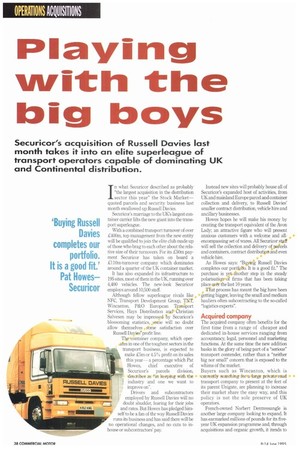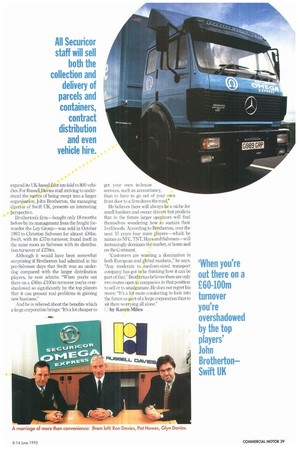Playing math the big 13cogs
Page 40

Page 41

If you've noticed an error in this article please click here to report it so we can fix it.
Securicor's acquisition of Russell Davies last month takes it into an elite superleague of transport operators capable of dominating UK and Continental distribution.
In what Securicor described as probably "the largest acquisition in the distribution sector this year" the Stock Market— quoted parcels and security business last month swallowed up Russell Davies
Securicor's marriage to the UK's largest container carrier lifts the new giant into the transport superleague.
With a combined transport turnover of over £400m, top management from the new entity will be qualified to join the elite club made up of those who brag to each other about the relative size of their turnovers. For its £50m payment Securicor has taken on board a £110m-turnover company which dominates around a quarter of the UK container market.
It has also expanded its infrastructure to 195 sites, most of them in the UK, running over 4,400 vehicles. The new-look Securicor employs around 10,500 staff, Although fellow superleague rivals like NFC, Transport Development Group, TNT, Wincanton, P&O European Transport Services, Hays Distribution and Christian Salvesen may be impressed by Securicor's blossoming statistics, some will no doubt allow themselves some satisfaction over Russell Davies' profit line.
The container company, which oper ates in one of the toughest sectors in the transport business, is expected to make £5m or 4,5% profit on its sales this year— a percentage which Pat Howes, chief executive of Securicor's parcels division, describes as "in keeping with the industry and one we want to improve on".
Drivers and subcontractors employed by Russell Davies will no doubt shudder, fearing for their jobs and rates. But Howes has pledged him self to be a fan of the way Russell Davies runs its business and has said there will be no operational changes, and no cuts to inhouse or subcontractors' pay. Instead new sites will probably house all of Securicor's expanded host of activities, from UK and mainland Europe parcel and container collection and delivery, to Russell Davies' smaller contract distribution, vehicle hire and ancillary businesses Howes hopes he will make his money by creating the transport equivalent of the Avon Lady; an attractive figure who will present anxious customers with a welcome and allencompassing set of wares. All Securicor staff will sell the collection and delivery of parcels and containers, contract distribution and even vehicle hire.
As Howes says: 'Buying Russell Davies completes our portfolio. It is a good fit." The purchase is yetanother step in the steady polarisation of firms that has been taking place over the last 10 years.
That process has meant the big have been getting bigger, leaving the small and medium hauliers often subcontracting to the so-called "logistics experts".
Acquired company
The acquired company often benefits for the first time from a range of cheaper and dedicated in-house services ranging from accountancy, legal, personnel and marketing functions. At the same time the new addition basks in the glory of being part of a "serious' transport contender, rather than a "neither big nor small" concern that is exposed to the whims of the market.
Buyers such as Wincanton, which is currently searching for a large private road transport company to present at the feet of its parent Unigate, are planning to increase their market share the easy way, and this policy is not the sole preserve of UK operators.
French-owned Norbert Dentressangle is another large company looking to expand. It has earmarked millions of pounds for its fiveyear UK expansion programme and, through acquisitions and organic growth, it itends to expand its UK-based fleet ten-fold to 800 vehicles. For Russell Davies staff striving to understand the merits of being swept into a larger organisation, John Brotherton, the managing director of Swift UK, presents an interesting perspective.
Brotherton's firm—bought only 18 months before by its management from the freight forwarder the Lep Group—was sold in October 1993 to Christian Salvesen for almost £84m. Swift. with its £57m-turnover, found itself in the same room as Salvesen with its distribution turnover of £276m.
Although it would have been somewhat surprising if Brotherton had admitted in his pre-Salvesen days that Swift was an underdog compared with the larger distribution players, he now admits: "When you're out there on a L60m-k100m turnover you're overshadowed so significantly by the top players that it can present real problems in gaining new business."
And he is relieved about the benefits which a large corporation brings: It's a lot cheaper to get your own in-house serivces, such as accountancy, than to have to go out of your own front door to a firm down the road."
He believes there will always be a niche for small hauliers and owner drivers but predicts that in the future larger operators will find themselves wondering how to sustain their livelihoods. According to Bmtherton, over the next 10 years four main players—which he names as NFC, TNT, Hays and Salvesen—will increasingly dominate the market, at home and on the Continent.
"Customers are wanting a domination in both European and global markets.," he says. "Any moderate to medium-sized transport company has got to be thinking how it can be part of that." Brotherton believes there are only two routes open to companies in that position: to sell or to amalgamate. He does not regret his move: "It's a lot more comforting to look into the future as part of a large corporation than to sit there worrying all alone."
by Karen Miles






































































































